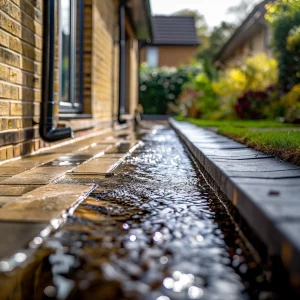
Efficient garden drainage is paramount in preserving a thriving home atmosphere. It underpins our property’s structural soundness, safeguarding against the potential perils of water accumulation and ensuing structural harm. These outdoor spaces, far more than mere appendages to our homes, are vital to the property’s overall condition, impacting its visual charm and structural health.
Incorporating affordable drainage solutions within our gardens doesn’t just prevent water-related issues; it’s an economical approach to ensuring our homes remain secure and visually appealing, emphasising the blend of functionality and beauty without straining our budgets.
The Science of Soil and Slope
Understanding soil composition and a garden’s slope is the first step towards implementing a robust drainage strategy. Soil types vary significantly in their water absorption and retention capabilities. Sandy soils, for instance, facilitate easy water flow, whereas clay-rich soils tend to retain water, posing a risk of waterlogging. It’s crucial to assess a garden’s soil type to determine the best approach to drainage.
Moreover, the slope of a garden directly influences how effectively water is diverted away from the home. Ideally, a garden should be graded to slope away from the property, ensuring that excess water is naturally directed towards drainage solutions rather than accumulating around the home’s foundation. This proactive approach not only preserves the property’s structural integrity but also enhances the health and beauty of the landscape.
Diverse Drainage Solutions

The approach to garden drainage must be multifaceted, employing various solutions tailored to specific needs. Here are some effective strategies:
- French Drains: An excellent solution for redirecting excess groundwater, French drains are sub-surface systems that prevent water from pooling in low-lying areas.
- Dry Wells & Catch Basins: These systems manage stormwater runoff, aiding in the recharge of groundwater while mitigating the risk of flooding.
- Trench Drains: Ideal for surface-level water interception, trench drains are effective in areas prone to heavy rainfalls.
- Sump Pumps: In particularly low-lying areas of a garden, a sump pump can be invaluable in mechanically evacuating water to prevent accumulation.
- Rain Gardens: Beyond their utility in runoff management, rain gardens add significant aesthetic value to a property, enhancing its visual appeal while serving a functional purpose.
- Permeable Pavers: By reducing surface runoff and enhancing soil absorption, permeable pavers contribute to a more sustainable and efficient drainage system.
- Downspout Extensions & Gutter Optimization: Properly diverting roof runoff away from a home’s foundation is essential in preventing water damage and preserving structural integrity.
Maintenance and Prevention: Key to Longevity
The effectiveness of any drainage solution is contingent upon regular maintenance and a commitment to prevention. Ensuring that gutters and drains are free from debris and blockages is fundamental to maintaining water flow away from a property. Moreover, opting for eco-friendly cleaning methods not only preserves the longevity of drainage systems but also contributes to a healthier environment. Regular professional check-ups can also preempt complex issues, ensuring drainage solutions remain effective and compliant with local regulations.
“The key to a lasting drainage solution is diligent maintenance and preventive measures. Keeping gutters and drainage paths free from obstructions is crucial to avoid water buildup and protect your home from potential damage. It’s more efficient and cost-effective to prevent issues before they happen, safeguarding your property’s foundation and landscaping. Regular upkeep is not just a matter of maintenance; it’s an investment in the health and longevity of your home.” – Mark Cordner, 24/7 Drainage UK.
Conscientious Water Management Practices
Responsibility for efficient water management extends beyond the installation of drainage systems. Water can be conserved by incorporating practices such as collecting roof runoff in rain barrels while reducing the strain on drainage infrastructure. Additionally, a conscious effort to reduce overall water usage contributes to the sustainability of the environment. Awareness of potential issues, such as tree root intrusion, and investing in preventative measures like drain guards are essential to a comprehensive water management strategy.
Selecting and Complying with Systems

Selecting the right drainage system for homes requires a nuanced understanding of the environment. Local climate intricacies, such as the frequency and intensity of rainfall, alongside the ground’s ability to absorb and manage this water, dictate the type of drainage system that will be most effective. Conducting permeability tests offers a scientific basis for these decisions, ensuring that chosen solutions are optimised for a specific landscape. Moreover, adherence to local regulations is paramount.
These standards are established to protect individual properties and the broader community and natural ecosystems from the adverse effects of improper water management. Aligning drainage strategies with these guidelines demonstrates a commitment to the collective welfare and sustainability of the environment, ensuring that efforts contribute positively to the broader ecosystem.
Strategic Implementation for Optimal Results
Strategic implementation of drainage solutions is pivotal for properties’ long-term health and safety. Constructing berms or adjusting the grading of gardens essentially sculpts the landscape to guide water flow away from critical structures, thereby mitigating potential water damage. These actions not only enhance the efficiency of water management but also contribute to the aesthetic value of outdoor spaces.
Professional installation plays a critical role, ensuring that chosen solutions are executed with precision and are in harmony with local environmental and building codes. This level of expertise ensures drainage systems are effective and durable, capable of withstanding the challenges posed by changing weather patterns and the natural settling of the landscape over time.
Preparedness for Emergencies
Despite best efforts, emergencies can arise. Maintaining a state of readiness with a clear and accessible emergency plan is crucial. Being prepared can distinguish between a swift resolution and a potentially costly and damaging situation.
Final Thoughts
Commitment to effective garden drainage is a testament to the dedication to preserving a property’s health and beauty. By adopting a comprehensive approach that spans understanding the fundamentals of soil and slope to implement diverse and sustainable drainage solutions, not only is a property safeguarded but also contributes to the well-being of the environment. Through regular maintenance, strategic planning, and emergency readiness, homes can remain vibrant and structurally sound sanctuaries for years.